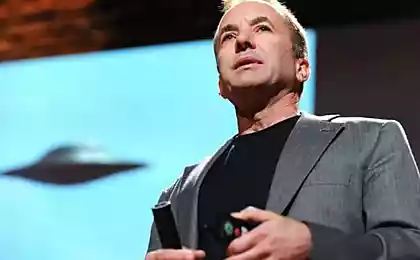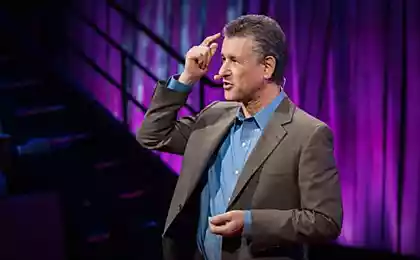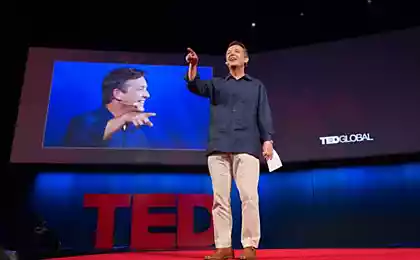764
We lie 10 to 200 times a day: the best TED talks about the truth and lies
We lie to others 10 to 200 times a day, and one to two times during the same time. But why is this happening and how can we learn to identify fraud? We decided to choose the best TED talks with a Russian voice acting, in which writers, scientists, sceptics and magicians share their knowledge about truth and lies: how to detect lies, why we underestimate children's deception, what new kinds of falsehoods appeared in the Internet era, characterised by our tendency to self-deception and what are the underlying causes of approval lies with society. The multifaceted study of lies, which only you can imagine.

Test lie detector/ © James Edward Westcott
Lying has evolutionary value to us as a species. Scientists have long known that the more intelligent the species, the more developed his representatives cortex, the more likely it is to deceive <...>. By nature we are hardwired to become leaders. It's starts very, very early. How early? Well babies will fake a cry, pause, wait to see who is coming and then go right back to crying.
Children under the age of one year learn to hide the truth. Two-year-olds bluff. Five years of shameless lying. They manipulate via flattery. Nine-year-olds are masters of disguise. By the time you enter College, you're going to lie to your mom in one out of five times.
At the time of entry into the adult work world in which we are earning their bread, we enter a world that is just cluttered with spam, fake digital friends, partisan media, ingenious identity thieves, Ponzi schemers a world-class, and a deception epidemic -- in short, in the world, what one author calls a post-true society. It was confusing from ancient times to the present day.
Pamela Meyer
Pamela Meyer: "How to spot a lie"
The study of lies confirms that every day we are confronted with the lie from 10 to 200 times, and the signs by which it can be recognized, can be subtle and difficult to understand. Pamela Meyer, author of the book "liespotting" reveals the signs and "hot spots", where trained people can find her. The speaker is sure that lying is a cooperative act, and if you have the necessary knowledge to detect lies, it will not have over you any authority. Pamela Meyer encourages you to remember that honesty is a value worth protecting.
In one day, according to studies, you may be lied to anywhere from 10 to 200 times. Granted, many of those are white lies. But other studies have shown that strangers talking to each other lie three times within the first 10 minutes of meeting. (Laughter) now, when we first hear this data, we recoil. We can't believe that the lie is so common.
By nature we are against lying. But if you look closely, it's much thinner. Extroverts lie more than introverts. Extroverts lie more than introverts. Men lie about themselves eight times more than others. Women lie more to protect someone. If you're an average married couple, you are going to lie to each other one time out of ten. You may think that it is bad. But if you are married, this figure will increase to three.
https://embed.ted.com/talks/lang/ru/pamela_meyer_how_to_spot_a_liar
SUBSCRIBE to OUR youtube channel that allows you to watch online, download from YouTube free video about the recovery, the rejuvenation of man. Love for others and ourselves, as the feeling of high vibrations — an important factor
Dan Ariely: "Failures in our moral code"
Researcher of behavioral Economics Dan Ariely studies the failures in our code of conduct: the hidden causes of the approval of the hype and (sometimes) theft. Non-trivial experiments help to prove his point that we are predictably irrational and can be influenced, without noticing it.
So what we found out about cheating because of this? We found out that many people can cheat. They cheat just by a little bit. When we remind people about their morality, they cheat less. When the distance of the cheating, from the object – for example, money, people cheat more. And when we see cheating around us, particularly if cheating someone out of their deception increases.
SUBSCRIBE to OUR youtube channel that allows you to watch online, download from YouTube free video about the recovery, the rejuvenation of man. Love for others and ourselves, as the feeling of high vibrations — an important factor
Jeff Hancock: "is There a future of lies"
Who didn't send an SMS with the words: "on my way"? Who is meant to embellish her profile on the Dating site? Jeff Hancock is convinced that the anonymity of the Internet does not encourage people to cheat. On the contrary, in his opinion, the easy availability of information in the search and its long storage in the network facilitates the detection of lies and forces us to be honest.
...1995, 1996 years people began to communicate in a completely different way. Email, SMS, Skype, Facebook. Crazy. Has changed almost every aspect of human communication. This transformation has affected lies. Let's talk about several new types of lies which we found and described. "The Butler", "shill" and "Chinese water army". Sounds weird, but they're all new types of lies.
https://embed.ted.com/talks/lang/ru/jeff_hancock_3_types_of_digital_lies
SUBSCRIBE to OUR youtube channel that allows you to watch online, download from YouTube free video about the recovery, the rejuvenation of man. Love for others and ourselves, as the feeling of high vibrations — an important factor
Marco tempest: "the Magic of truth, lies and iPods"
Using three iPods like magical props, cyberintrusions Marco tempest spins a clever, surprisingly heartfelt meditation on truth and lies, art and emotion.
The brain has a wonderful ability to forget. Bad experiences are quickly forgotten. Bad experiences quickly disappear. For this reason, in this vast and lonely cosmos, we are so wonderfully optimistic. Our self-deception becomes a positive illusion -- why movies can help us to go on an incredible journey; why we believe Romeo when he says he loves Juliet; and why some notes played together become a Sonata and conjure up meaning.
SUBSCRIBE to OUR youtube channel that allows you to watch online, download from YouTube free video about the recovery, the rejuvenation of man. Love for others and ourselves, as the feeling of high vibrations — an important factor
Michael Shermer: "the Model of self-deception"
American historian, popularizer of science, and chief editor of the magazine "Skeptiс" Michael Shermer argues that the human tendency to believe in amazing things — from alien abductions to the vines to search for water — boils down to two main unconscious instincts of self-preservation. He explains what they are and how this brought us to disaster.
So today I want to talk about faith. I want to believe... And you too, of course. And in fact, I would argue that in order to believe in something. This is our standard property <...>. And the reason for this is that in our mind is the motor of faith, that is, in fact, we are primates who are committed to finding patterns, templates — we build a logical relationship between the elements: A linked to B B linked to C, and sometimes do
A is associated with B. This is called associative thinking. We find the matching templates. We create these ties. Whether it is Pavlov's dog who associates the ringing bell with food and starts drooling when he heard it. Or a rat Skinner, which is imposed on the Association between its behavior and receive the promotion, with the result that it behaves as in previous times <...>.
I call this process "stereotyping", it has a tendency to look for patterns everywhere — and where they are and meaningless noise. In the process of the search may be two types of errors. A type I error — false positive: when we believe that a pattern exists, but in fact it is not. The second type of error — skipping events.
The second type of error is the rejection of the real existing pattern. Let's do a thought experiment. Imagine, three million years ago, you're a hominid walking on the plains of Africa. Well, your name is Lucy, ok? And you hear a rustle in the grass. What is it? Dangerous predator or just the wind? Your next decision may be the most important in life.
If you think that the rustle in the grass is a dangerous predator and it turns out it was just the wind, then you have made a recognition error, made an error of the first kind — false positive. Nothing to worry about. You just went from there. You're more cautious. On the other hand, if you felt that it was just the wind, but in reality it is a dangerous predator, you're lunch. Won the Darwin award. Took a contribution from the human gene pool.
SUBSCRIBE to OUR youtube channel that allows you to watch online, download from YouTube free video about the recovery, the rejuvenation of man. Love for others and ourselves, as the feeling of high vibrations — an important factor
Kang Lee: "are we Able to detect children's deception"
How children are bad liars? Do you think that you can easily identify children's deception? A researcher Kang Lee studies what happens with the psychology of children when they cheat. They do it often, starting from the age of two, and they succeed. Lee explains why we should rejoice when children begin to lie, and introduces new technology to identify fraud, which will one day be able to detect our hidden emotions.
Now let's look at young children. Why some of them cheat, but not all? When cooking, we need good ingredients to make a tasty dish. Good deception requires two key ingredients.
The first of these is the theory of thought, or the ability to read minds. The ability to read minds is the knowledge that different people are differently informed about the situation, and the ability to make a distinction between what I know and that know you. Reading thoughts is important for tricking, because its based on what I know, and you don't know what I know. So I can deceive you.
The second ingredient of a good deceit is self — control. This ability to control speech, facial expression and your body language to deception was convincing. We found that those young children who are more advanced in terms of mind reading and self-monitoring, start to cheat before, and are more sophisticated tricksters.
It turns out that both of these abilities are very important for us to function well in society. In fact, the lack of insight and self-control is associated with serious developmental problems such as attention deficit, hyperactivity and autism. So if your two year old child for the first time cheating instead of worrying, you should be glad.
Put LIKES and share with your FRIENDS!
www.youtube.com/channel/UCXd71u0w04qcwk32c8kY2BA/videos
The algorithm for determining life's purposethe 3 main law of the universe
Source: monocler.ru/issledovanie-lzhi/

Test lie detector/ © James Edward Westcott
Lying has evolutionary value to us as a species. Scientists have long known that the more intelligent the species, the more developed his representatives cortex, the more likely it is to deceive <...>. By nature we are hardwired to become leaders. It's starts very, very early. How early? Well babies will fake a cry, pause, wait to see who is coming and then go right back to crying.
Children under the age of one year learn to hide the truth. Two-year-olds bluff. Five years of shameless lying. They manipulate via flattery. Nine-year-olds are masters of disguise. By the time you enter College, you're going to lie to your mom in one out of five times.
At the time of entry into the adult work world in which we are earning their bread, we enter a world that is just cluttered with spam, fake digital friends, partisan media, ingenious identity thieves, Ponzi schemers a world-class, and a deception epidemic -- in short, in the world, what one author calls a post-true society. It was confusing from ancient times to the present day.
Pamela Meyer
Pamela Meyer: "How to spot a lie"
The study of lies confirms that every day we are confronted with the lie from 10 to 200 times, and the signs by which it can be recognized, can be subtle and difficult to understand. Pamela Meyer, author of the book "liespotting" reveals the signs and "hot spots", where trained people can find her. The speaker is sure that lying is a cooperative act, and if you have the necessary knowledge to detect lies, it will not have over you any authority. Pamela Meyer encourages you to remember that honesty is a value worth protecting.
In one day, according to studies, you may be lied to anywhere from 10 to 200 times. Granted, many of those are white lies. But other studies have shown that strangers talking to each other lie three times within the first 10 minutes of meeting. (Laughter) now, when we first hear this data, we recoil. We can't believe that the lie is so common.
By nature we are against lying. But if you look closely, it's much thinner. Extroverts lie more than introverts. Extroverts lie more than introverts. Men lie about themselves eight times more than others. Women lie more to protect someone. If you're an average married couple, you are going to lie to each other one time out of ten. You may think that it is bad. But if you are married, this figure will increase to three.
https://embed.ted.com/talks/lang/ru/pamela_meyer_how_to_spot_a_liar
SUBSCRIBE to OUR youtube channel that allows you to watch online, download from YouTube free video about the recovery, the rejuvenation of man. Love for others and ourselves, as the feeling of high vibrations — an important factor
Dan Ariely: "Failures in our moral code"
Researcher of behavioral Economics Dan Ariely studies the failures in our code of conduct: the hidden causes of the approval of the hype and (sometimes) theft. Non-trivial experiments help to prove his point that we are predictably irrational and can be influenced, without noticing it.
So what we found out about cheating because of this? We found out that many people can cheat. They cheat just by a little bit. When we remind people about their morality, they cheat less. When the distance of the cheating, from the object – for example, money, people cheat more. And when we see cheating around us, particularly if cheating someone out of their deception increases.
SUBSCRIBE to OUR youtube channel that allows you to watch online, download from YouTube free video about the recovery, the rejuvenation of man. Love for others and ourselves, as the feeling of high vibrations — an important factor
Jeff Hancock: "is There a future of lies"
Who didn't send an SMS with the words: "on my way"? Who is meant to embellish her profile on the Dating site? Jeff Hancock is convinced that the anonymity of the Internet does not encourage people to cheat. On the contrary, in his opinion, the easy availability of information in the search and its long storage in the network facilitates the detection of lies and forces us to be honest.
...1995, 1996 years people began to communicate in a completely different way. Email, SMS, Skype, Facebook. Crazy. Has changed almost every aspect of human communication. This transformation has affected lies. Let's talk about several new types of lies which we found and described. "The Butler", "shill" and "Chinese water army". Sounds weird, but they're all new types of lies.
https://embed.ted.com/talks/lang/ru/jeff_hancock_3_types_of_digital_lies
SUBSCRIBE to OUR youtube channel that allows you to watch online, download from YouTube free video about the recovery, the rejuvenation of man. Love for others and ourselves, as the feeling of high vibrations — an important factor
Marco tempest: "the Magic of truth, lies and iPods"
Using three iPods like magical props, cyberintrusions Marco tempest spins a clever, surprisingly heartfelt meditation on truth and lies, art and emotion.
The brain has a wonderful ability to forget. Bad experiences are quickly forgotten. Bad experiences quickly disappear. For this reason, in this vast and lonely cosmos, we are so wonderfully optimistic. Our self-deception becomes a positive illusion -- why movies can help us to go on an incredible journey; why we believe Romeo when he says he loves Juliet; and why some notes played together become a Sonata and conjure up meaning.
SUBSCRIBE to OUR youtube channel that allows you to watch online, download from YouTube free video about the recovery, the rejuvenation of man. Love for others and ourselves, as the feeling of high vibrations — an important factor
Michael Shermer: "the Model of self-deception"
American historian, popularizer of science, and chief editor of the magazine "Skeptiс" Michael Shermer argues that the human tendency to believe in amazing things — from alien abductions to the vines to search for water — boils down to two main unconscious instincts of self-preservation. He explains what they are and how this brought us to disaster.
So today I want to talk about faith. I want to believe... And you too, of course. And in fact, I would argue that in order to believe in something. This is our standard property <...>. And the reason for this is that in our mind is the motor of faith, that is, in fact, we are primates who are committed to finding patterns, templates — we build a logical relationship between the elements: A linked to B B linked to C, and sometimes do
A is associated with B. This is called associative thinking. We find the matching templates. We create these ties. Whether it is Pavlov's dog who associates the ringing bell with food and starts drooling when he heard it. Or a rat Skinner, which is imposed on the Association between its behavior and receive the promotion, with the result that it behaves as in previous times <...>.
I call this process "stereotyping", it has a tendency to look for patterns everywhere — and where they are and meaningless noise. In the process of the search may be two types of errors. A type I error — false positive: when we believe that a pattern exists, but in fact it is not. The second type of error — skipping events.
The second type of error is the rejection of the real existing pattern. Let's do a thought experiment. Imagine, three million years ago, you're a hominid walking on the plains of Africa. Well, your name is Lucy, ok? And you hear a rustle in the grass. What is it? Dangerous predator or just the wind? Your next decision may be the most important in life.
If you think that the rustle in the grass is a dangerous predator and it turns out it was just the wind, then you have made a recognition error, made an error of the first kind — false positive. Nothing to worry about. You just went from there. You're more cautious. On the other hand, if you felt that it was just the wind, but in reality it is a dangerous predator, you're lunch. Won the Darwin award. Took a contribution from the human gene pool.
SUBSCRIBE to OUR youtube channel that allows you to watch online, download from YouTube free video about the recovery, the rejuvenation of man. Love for others and ourselves, as the feeling of high vibrations — an important factor
Kang Lee: "are we Able to detect children's deception"
How children are bad liars? Do you think that you can easily identify children's deception? A researcher Kang Lee studies what happens with the psychology of children when they cheat. They do it often, starting from the age of two, and they succeed. Lee explains why we should rejoice when children begin to lie, and introduces new technology to identify fraud, which will one day be able to detect our hidden emotions.
Now let's look at young children. Why some of them cheat, but not all? When cooking, we need good ingredients to make a tasty dish. Good deception requires two key ingredients.
The first of these is the theory of thought, or the ability to read minds. The ability to read minds is the knowledge that different people are differently informed about the situation, and the ability to make a distinction between what I know and that know you. Reading thoughts is important for tricking, because its based on what I know, and you don't know what I know. So I can deceive you.
The second ingredient of a good deceit is self — control. This ability to control speech, facial expression and your body language to deception was convincing. We found that those young children who are more advanced in terms of mind reading and self-monitoring, start to cheat before, and are more sophisticated tricksters.
It turns out that both of these abilities are very important for us to function well in society. In fact, the lack of insight and self-control is associated with serious developmental problems such as attention deficit, hyperactivity and autism. So if your two year old child for the first time cheating instead of worrying, you should be glad.
Put LIKES and share with your FRIENDS!
www.youtube.com/channel/UCXd71u0w04qcwk32c8kY2BA/videos
The algorithm for determining life's purposethe 3 main law of the universe
Source: monocler.ru/issledovanie-lzhi/





















